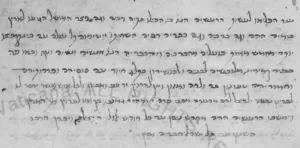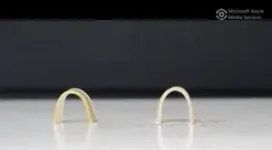(Press-News.org) The chance discovery of a note written in a 15th century Hebrew prayer book fills an important gap in the historical Italian earthquake record, offering a brief glimpse of a previously unknown earthquake affecting the Marche region in the central Apennines.
Paolo Galli, who found the note in the Apostolic Vatican Library while looking for contemporaneous accounts of another historic Italian earthquake, writes in Seismological Research Letters that the note “not only helps us partially fill a gap in the seismic history of Italy but also prompts us to reflect on how we still do not know about seismogenesis even in times covered by written sources.”
“The wealth of historical sources in Italy is undoubtedly one of the richest, but it is equally subject to gaps both in terms of time and in places,” said Galli. “Unlike the Kingdom of Naples, for example, the production of documentation related to earthquakes has certainly been poorer in the Papal States, of which the Marche Region was a part in the 15th century.”
The note discovered by Galli was written on the leaf of the prayer book, which was copied in the Marche town of Camerino and completed in September-October 1446. The eight lines of the note describe an earthquake around Camerino that knocked down houses, the governor’s courtyard, and destroyed cities and villages “that have become a mound of stone.”
Men and women “come here in Camerino dressed in white pale dresses with their horses and mules and donkeys loaded with bread and food and wine, in order to hold the hand of the poor,” the note relates, while stating that the earthquakes in the area continued from March to September.
The note is the only evidence of a damaging earthquake in the Marche region from the 15th century. Galli said a 1446 petition asking for funds to restore city walls and a castle in Petrino, a settlement 20 kilometers away from Camerino, may be the only other possible written indication of a damaging earthquake in the region.
There are only 450 documented earthquake site observations from Italy for the 15th century, and about half of those observations come from a key historic earthquake sequence in 1456 in the south-central Apennines. Galli had been looking through the library’s manuscripts from the Middle Ages to find more information about this sequence when he came across the prayer book.
“The earthquake of 1456, or rather, the earthquakes of 1456, represent the most catastrophic seismic sequence that occurred in the late Middle Ages in central-southern Italy,” he explained. “Despite the abundance of historical sources, particularly a specific treatise on the earthquake written by the famous humanist Giannozzo Manetti, we still do not have certainties about the different epicentral areas and, therefore, the parameters of individual mainshocks—magnitude and epicenter—and their seismic sources.”
The damage described in the prayer book note suggests that Camerino may have experienced intense shaking, measuring about an 8 on the Mercalli-Cancani-Sieberg intensity scale, Galli said. This level implies severe damage and partial collapse to half of the town’s buildings, along with the fall of columns, monuments and walls.
Galli suggested the Camerino earthquake might have been a “twin” to a 1799 sequence in the region, where a magnitude 6.2 earthquake caused similar intense shaking.
“Of course, this is only a hypothesis, but by comparing the epicentral area and the level of damage in Camerino and its surroundings, it is possible that the effects described in our manuscript describe, albeit briefly, something similar to the event of 1799,” Galli noted.
“In particular, the manuscript mentions that many settlements around Camerino were reduced to piles of stones, indicating that the epicentral area was possibly the same as in 1799,” he added. “Similarly, the absence of information in the far field suggests that the earthquake was likely caused by a shallow-depth fault, as probably occurred in 1799.”
END
Hebrew prayer book fills gap in Italian earthquake history
2023-11-01
ELSE PRESS RELEASES FROM THIS DATE:
UChicago chemists make breakthrough in drug discovery chemistry
2023-11-01
For years, if you asked the people working to create new pharmaceutical drugs what they wished for, at the top of their lists would be a way to easily replace a carbon atom with a nitrogen atom in a molecule.
But two studies from chemists at the University of Chicago, published in Science and Nature, offer two new methods to address this wish. The findings could make it easier to develop new drugs.
“This is the grand-challenge problem that I started my lab to try to solve,” said Mark Levin, ...
Docetaxel use associated with significant reduction in prostate cancer death in very poor prognostic group
2023-11-01
Men with high-grade prostate cancer and low prostate-specific antigen (PSA) levels have a poor prognosis. The question remains as to whether the chemotherapy drug docetaxel, which increases survival in metastatic prostate cancer, can improve the cure rate in these patients.
In a new study, investigators from Brigham and Women’s Hospital, a founding member of the Mass General Brigham healthcare system, a meta-analysis of five prospective randomized clinical trials (RCTs) found that adding docetaxel to standard-of-care (SOC) treatment was associated with a 70% reduction in death from prostate cancer-specific ...
Pet ownership may contribute to health care barriers for people with HIV
2023-11-01
People living with HIV may face hard choices when balancing their own health needs with caring for a pet, a study led by a University of Florida College of Public Health and Health Professions researcher finds.
For the study, which appears in the journal PLOS ONE, 36% of people with HIV who own pets reported delaying health care, not seeking it or said they expect to do so in the future. Financial and other resource concerns, including not having access to pet sitting or boarding services, are among the leading factors that may contribute to health care barriers among pet owners ...
Test detects co-infection by novel species of parasite in severe cases of visceral leishmaniasis
2023-11-01
In recent years, physicians and scientists in parts of Brazil where visceral leishmaniasis (VL) is endemic have seen rising numbers of cases of co-infection by Leishmania infantum and Crithidia, also a protozoan but hitherto believed to be a mosquito parasite that cannot infect humans or other mammals. Accurate diagnosis is hindered by a lack of simple specific tests (more at: https://agencia.fapesp.br/42072 and https://agencia.fapesp.br/31581).
To accelerate and facilitate detection of the pathogens involved, supporting appropriate decisions regarding treatment, researchers at the Federal University of São Carlos (UFSCar) have developed a PCR test ...
Dr. Zainab Mahmoud to receive the 2023 Dr. Nanette K. Wenger Research Goes Red® Award
2023-11-01
DALLAS, Nov. 1, 2023 – The American Heart Association will present the 2023 Dr. Nanette K. Wenger Research Goes Red® Award to Zainab Mahmoud, M.D., M.Sc., of Washington University School of Medicine in St. Louis. This award will be presented during the opening session of the Association’s Scientific Sessions 2023 on Saturday, Nov. 11. The meeting, to be held in Philadelphia, Saturday, Nov. 11 through Monday, Nov. 13, is a premier global exchange of the latest scientific advancements, ...
Lepore chosen to lead Public Policy & Aging Report
2023-11-01
The Gerontological Society of America (GSA) — the nation’s largest interdisciplinary organization devoted to the field of aging — has named Michael Lepore, PhD, of the University of Massachusetts (UMass) Amherst as the next editor-in-chief of the journal Public Policy & Aging Report, effective January 2024.
“I am honored to serve as editor-in-chief of Public Policy & Aging Report, which for nearly 30 years has provided non-partisan analyses of aging-related policy issues,” Lepore said. “This venerable journal has been a mainstay of my training and professional ...
Dr. Mary McGrae McDermott to be awarded the 2023 Clinical Research Prize
2023-11-01
DALLAS, Nov. 1, 2023 — The American Heart Association will present the 2023 Clinical Research Prize to Mary McGrae McDermott, M.D., FAHA, of Northwestern University’s Feinberg School of Medicine in Chicago. The Clinical Research Prize is awarded annually to physicians or scientists who are advancing clinical science in support of the Association’s mission.
Dr. McDermott has dedicated her career to advancing medical knowledge of peripheral artery disease (PAD). She will be recognized during the presidential session on Sunday, Nov. 12, 2023 at the Association’s Scientific Sessions ...
Dr. Olugbenga Ogedegbe to receive the 2023 Population Health Research Prize
2023-11-01
DALLAS, Nov. 1, 2023 — The American Heart Association will present its 2023 Population Health Research Prize to Olugbenga “Gbenga” Ogedegbe, M.D., M.P.H., FAHA, of New York University’s Grossman School of Medicine. He will be recognized during the presidential session of the Association’s Scientific Sessions 2023 on Sunday, Nov. 12. The meeting will be held in Philadelphia, Saturday, Nov. 11 through Monday, Nov. 13 and is a premier global exchange of the latest scientific advancements, research and evidence-based clinical practice updates in cardiovascular science.
Dr. ...
Dr. Marc A. Pfeffer to be receive the 2023 Eugene Braunwald Academic Mentorship Award
2023-11-01
DALLAS, Nov. 1, 2023 — The American Heart Association will present its 2023 Eugene Braunwald Academic Mentorship Award to Marc A. Pfeffer, M.D., Ph.D., FAHA, of Harvard Medical School and Brigham and Women’s Hospital. The Eugene Braunwald Academic Mentorship Award will be recognized during the Presidential Session on Sunday, Nov. 12, 2023, at the Association’s Scientific Sessions 2023. The meeting, to be held in Philadelphia, Saturday, Nov. 11 through Monday, Nov. 13, is a premier global exchange of the latest scientific advancements, research and evidence-based clinical practice updates in cardiovascular science.
The Eugene Braunwald Academic ...
What happens when cats get fat? Scientists weigh in
2023-11-01
URBANA, Ill. – Cat owners want Kitty to be happy, but providing an abundance of food and snacks can have unintended consequences. Feline obesity is on the rise, impacting the health, longevity, and wellbeing of cats. A new study from the University of Illinois Urbana-Champaign looks at what happens in the digestive system and gut microbiota when cats eat too much.
“About 60% of cats in the U.S. are overweight, which can lead to health problems such as diabetes and chronic inflammation. While many studies have investigated feline weight loss, there has been little focus on the opposite process, ...



